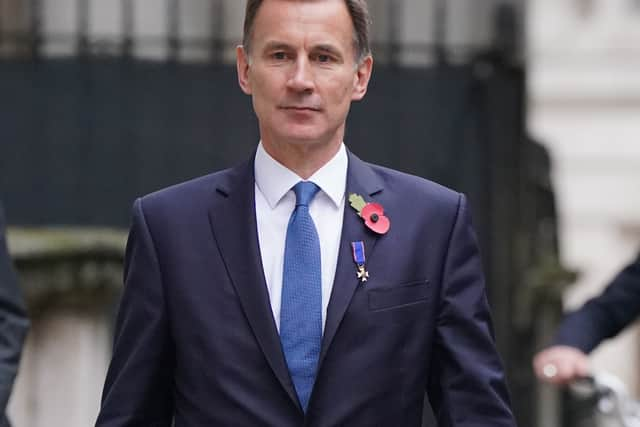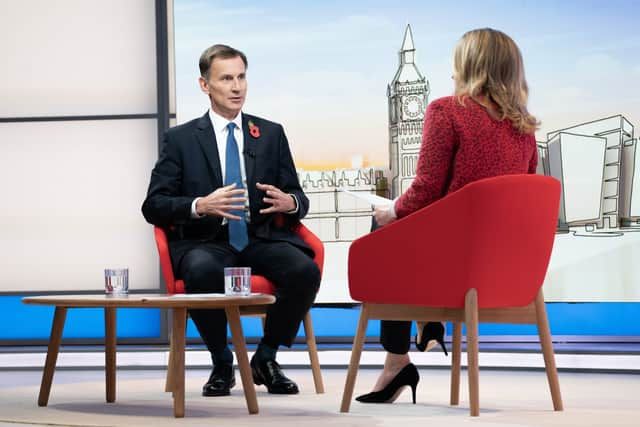Jeremy Hunt: everyone will be paying more tax after autumn statement as Chancellor seeks to calm economy
and live on Freeview channel 276
Jeremy Hunt has said that everyone will be paying more tax after the autumn budget, warning that “sacrifices” are required to get the country’s economy back under control.
The Chancellor warned on Sunday (13 November) of “difficult” decisions to come, such as cuts to public spending, but was simultaneously keen to stress that his next financial announcement is “not just going to be bad news”. He also confirmed that those who earn the most will be making the largest sacrifices, in recognition of the fact that “there is only so much [the government] can ask” from those on lower incomes.
Advertisement
Hide AdAdvertisement
Hide AdHis words come just days ahead of the Treasury’s highly-anticipated autumn statement, which will be announced on Thursday (17 November) once Prime Minister Rishi Sunak has returned from the G20 leaders summit in Bali, Indonesia. This will be Hunt’s biggest test yet as Chancellor, as he hopes to restore confidence in the UK’s economic handling after Liz Truss’ £45 billion tax-slashing mini budget plunged the financial markets into chaos.
Speaking to Sky News, he said: “Well, we are all going to be paying a bit more tax, I’m afraid … but it is not just going to be bad news. I think what people recognise is that if you want to give people confidence about the future, you have to be honest about the present and you have to have a plan and this will be a plan to help bring down inflation, help control high energy prices and also get our way back towards growing healthily, which is what we need so much.”


He added that his economic statement will detail both short and long-term plans, and will serve to bring down inflation, control sky-high energy prices, and restore “healthy” growth. The South West Surrey MP previously promised to make a possible recession “shallower and quicker” after GDP contracted between July and September, which many feared to be a sign of the beginning of the longest recession on record.
Hunt also addressed concerns about energy bill support, confirming that he will announce upcoming plans in his statement on Thursday (17 November). He told the BBC’s Sunday with Laura Kuenssberg that households will continue to receive support, but there will be some “constraints”.
Advertisement
Hide AdAdvertisement
Hide AdThe MP said: “Will it be uncapped, unlimited? We have to recognise that one of the reasons for the instability that followed the mini-budget was that people were worried that we were exposing British public finances to the volatility of the international gas market. So, there has to be some constraints to it. But, yes, we will continue to support families and I will explain exactly how we’re going to do that.”
The Sunday Telegraph reported that ministers are considering lowering the threshold at which employees pay the highest rate of income tax from £150,000 to £125,000, something which aligns with the Chancellor’s assurance that “people with the broadest shoulders will bear the heaviest burden.” He said that this mindset “will be reflected in the decisions that I take” because “Britain is a decent country, a fair country, a compassionate country.”
Hunt’s assurance could be interpreted as a response to the Labour Party, who urged the government to make “fair choices” in the upcoming statement and not put the burden on “ordinary working people”. Shadow Chancellor Rachel Reeves also warned that public services are “on their knees” and that “austerity 2.0” is not the right thing to do.
Meanwhile, Simon Clarke, who was Levelling Up Secretary during Truss’ short tenure in Number 10, has called for the books to be balanced through spending cuts rather than tax rises. He said: “I would urge Jeremy to make sure we do as much as we can from spending reductions as opposed to tax increases, noting tax is at a very high level, and faced with the recession risk.”


Advertisement
Hide AdAdvertisement
Hide AdIt is understood however that both tax hikes and spending cuts will be on the table next Thursday - even if it is not what the Chancellor may have initially wanted. In an interview with the Sunday Times, Hunt said that the “tragedy” of Truss’ tax cuts was that both she and her Chancellor Kwasi Kwarteng had the right idea about boosting growth. But he said it was a “mistake” to act without showing “we can pay our way as a country”, adding that he will “put people ahead of ideology”.
According to the Resolution Foundation, the disastrous mini-budget may have cost the country as much as £30 billion. Economists from the think tank estimated that Truss and Kwarteng blew £20 billion on unfunded cuts to national insurance and stamp duty, and that a further £10 billion was lost to higher interest rates and government borrowing costs.
Hunt reportedly needs to find up to £60 billion in savings and extra revenue, so these losses essentially double the task at hand. In the Chancellor’s own words, it will be a “tough road ahead” - but we’ll have to wait until 17 November to find out exactly how he plans to tackle it.
Comment Guidelines
National World encourages reader discussion on our stories. User feedback, insights and back-and-forth exchanges add a rich layer of context to reporting. Please review our Community Guidelines before commenting.
